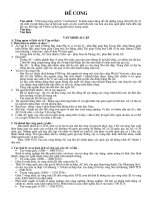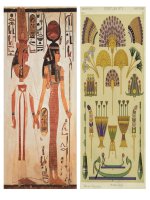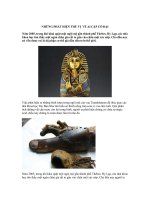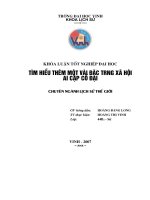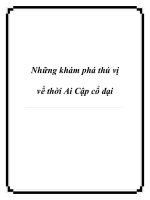ai cap co dai
Bạn đang xem bản rút gọn của tài liệu. Xem và tải ngay bản đầy đủ của tài liệu tại đây (103.15 KB, 4 trang )
<span class='text_page_counter'>(1)</span><div class='page_container' data-page=1>
a/an and one
PEG 4
Insert <b>a/an</b> or<b> one</b> if necessary.
1 . . . of my friends advised me to take . . . taxi; another said that there was quite . . . good bus service.
2 . . . friend of mine lent me . . . book by Meredith. I've only . . . more chapter to read. Would you like . . . loan
of it afterwards?~
No, thanks. I read . . . of his books . . . few years ago and didn't like it. Besides I have . . . library book to
finish. If I don't take it back tomorrow I'll have to pay . . . fine.
3 . . . man I met on the train told me . . . rather unusual story.
4 Most people like . . . rest after . . . hard day's work, but Tom seemed to have . . . inexhaustible supply of
energy.
5 I've told you . . . hundred times not to come into . . . room with . . . hat on.
6 It's unlucky to light three cigarettes with . . . match. ~
That's only . . . superstition. Only . . . idiot believes in superstitions.
7 He says . . . caravan is no good; he needs . . . cottage.
8 . . . plate is no good; we need . . . dozen.
9 Last time there was . . . fog here . . . plane crash-landed in . . . field near the airport. The crew had . . . lucky
escape. . . . man broke his leg; the rest were unhurt.
10 You've been . . . great help to me; . . . day I will repay you.
11 My car broke down near . . . bus stop. There was . . . man waiting for . . . bus so I asked him for . . . advice.
12 He took . . . quick look at my car and said, 'Buy . . . new . . . .'
13 There was . . . woman there. The rest were men. ~
There shouldn't have been even . . . woman. It was meant to be . . . stag party.
14 Don't tell . . . soul! Not even your wife! ~
Of course not! I'd never tell . . . secret to . . . woman.
15 Most of the staff had been there for only . . . very short time, but . . . man had been there . . . year and . . .
half, so he knew . . . little more than the rest.
16 Could you lend me . . . dictionary, please? I'm trying to do . . . crossword puzzle. ~
I'm afraid I've only got . . . dictionary, and Tom's borrowed it.
17 . . . chop won't be enough for Tom; he'll want two; he's . . . small man but he's got . . . big appetite.
18 1 want . . . volunteers for . . . dangerous job,' said the captain.
There was . . . long silence.
'Isn't there even . . . man who will take . . . risk?' he asked.
. . . voice called out from the back, 'Will there be . . . reward?'
19 I have . . . flat on the top floor. You get . . . lovely view from there.
20 . . . day a new director arrived. He was . . . ambitious, bad-tempered man, and the staff took . . . instant
dislike to him.
21 Suddenly . . . bullet struck . . . street lamp . . . little to Bill's left. He looked up and saw . . . man with . . . gun
standing at . . . open window.
22 Bill fired back twice. . . . bullet hit the wall, the other broke . . . pane of . . . glass. He heard . . . angry shout.
23 . . . day—it was . . . dry day with . . . good visibility—Tom was driving along . . . country road in . . .
borrowed car.
24 You're making . . . mistake after another. Have you . . . hangover, or something? ~
No, but I had . . . very bad night last night. The people next door were having . . .
party. ~
. . . bad night shouldn't have such . . . effect on your work. I often have three bad
nights in succession. I live in . . . very noisy street.
Auxiliary Verbs
Auxiliary verbs
PEG 106-7
Auxiliaries here are used both alone and as part of various tenses of ordinary verbs.
Read the following (a) in the negative (b) in the interrogative. These sentences, except for nos. I and 13, could
also be used for question tag exercises (see Exercise 13).
</div>
<span class='text_page_counter'>(2)</span><div class='page_container' data-page=2>
Note:
1 <b>may</b> for possibility rarely begins a sentence. Instead we use <b>do</b> you think (that) + present/future or <b>is</b> +
subject + likely + infinitive:
Tom may know.
Do you think (that) Tom knows?
Is Tom likely to know?
2 Use<b> needn't</b> as the negative of<b> must.</b>
1 It may cost Ј100.
2 Men should help with the housework.
3 Tom would pay her.
4 They could play the guitar.
5 We're seeing Mary tomorrow.
6 She ought to keep it in the f ridge.
7 You can understand it.
8 The police were watching the house.
9 You can go with him.
10 They've got a house.
11 Your boss will be angry.
12 Tom should pay the fine.
13 They may come tonight.
14 They were cleaning their shoes.
15 He must write in French.
16 You have read the instructions.
17 These pearls are made by oysters.
18 The ice was thick enough to walk on.
19 This will take a long time.
20 They may <i>(permission)</i> take the car.
21 You've made a mistake.
22 Ann would like a skiing holiday.
23 We must do it at once.
24 Tom could come.
25 They were in a hurry.
26 There is enough salt in it.
27 You could see the sea from the house.
28 Ann will be able to drive you.
29 They had written to him.
30 We must cook it in butter.
31 It is freezing.
32 She ought to accept the offer.
33 There'11 be time for tea.
34 I'm right.
35 He may be at home.
36 He used to live here.
Auxiliaries conjugated with
<b>do/does/did</b>
Some auxiliaries when used in certain ways make their negative and interrogative according to the rule for
ordinary verbs, i.e. with<b> do.</b>
Sometimes either form is possible.
Make the sentences (a) negative and (b) interrogative, using do/does/did.
1 They have eggs for breakfast.
2 He needs a new coat.
3 He used to sell fruit.
4 They have to work hard.
5 She does the housework.
</div>
<span class='text_page_counter'>(3)</span><div class='page_container' data-page=3>
6 He needs more money.
7 He had a row with his boss.
8 She had a heart attack.
9 Her hair needed cutting.
10 He does his homework after supper.
11 She has a singing lesson every week.
12 She had to make a speech.
13 He does his best.
14 He has to get up at six every day.
15 The children have dinner at school.
16 She dared him to climb it.
17 You did it on purpose.
18 He has his piano tuned regularly, <i>(see 119)</i>
19 He dares to say that!
20 They had a good time.
21 The drink did him good.
22 My watch needs cleaning.
23 He had an accident.
24 You had your house painted.
25 She used to make her own clothes.
26 You do the exercises.
27 He had difficulty (in) getting a job.
28 He dared to interrupt the president, did he? (<i>Omit final</i> did he?)
Auxiliary verbs
Put the following verbs into the past tense. (Auxiliaries are used both by themselves and
as part of certain forms and tenses of ordinary verbs.)
Use<b> had to</b> as the past tense of<b> must</b> and<b> didn't need</b> as a past tense of<b> needn't.</b>
1 He isn't working hard.
2 She doesn't like cats.
3 I can't say anything.
4 We must read it carefully.
5 He won't help us.
6 He can lift it easily.
7 It isn't far from London.
8 Isn't it too heavy to carry?
9 He needn't pay at once.
10 He hopes that Tom will be there. (He hoped . . .)
11 How much does this cost?
12 He says that Ann may be there. (He said . . :)
13 How old is he?
14 Do you see any difference?
15 I do what I can.
16 How far can you swim?
17 I must change my shoes.
18 Tom dares not complain.
19 I don't dare (to) touch it.
20 Have you time to do it?
21 Are you frightened?
22 Must you pay for it yourself?
23 The letter needn't be typed.
24 We hope that he'll come. (We hoped. . .)
25 He says that she may not be in time. (He said that she . . .)
26 Do you understand what he is saying? I don't.
27 There are accidents every day at these crossroads.
28 She thinks that it may cost Ј100. (She thought that it . . .)
29 Doesn't Mr Pitt know your address?
</div>
<span class='text_page_counter'>(4)</span><div class='page_container' data-page=4>
30 They aren't expecting me, are they?
31 He thinks that the snakes may be dangerous, <i>(see 28)</i>
32 She wants to know if she can borrow the car. (She wanted to know if...)
33 Can't you manage on Ј100 a week?
34 Tom is certain that he will win.
35 Can you read the notice? No, I can't.
36 I don't think that the bull will attack us.
Auxiliary verbs
PEG 108
Answer the following questions (a) in the affirmative (b) in the negative, in each case
repeating the auxiliary and using a pronoun as subject.
Do you need this? ~ <i>Yes, I do/No, I don't.</i>
Can Tom swim? - <i>Yes, he can/No, he can't.</i>
Note also:
Is that Bill? ~ <i>Yes, it is/No, it isn't.</i>
Will there be time? ~ <i>Yes, there will/No, there won't.</i>
Use<b> needn't</b> in 7 and 15. Use<b> must</b> in 26 and 35.
1 Is the water deep?
2 Do you know the way?
3 Can you swim?
4 Does he come every day?
5 Is that Tom over there?
6 Are you Tom's brother?
7 Must you go?
8 Are you enjoying yourselves?
9 Did he see you?
10 Would Ј10 be enough?
11 May I borrow your car?
12 Is this the front of the queue?
13 Will she be there?
14 Do you play cards?
15 Should I tell the police?
16 Can you cook?
17 Are you ready?
18 Could women join the club?
19 Is your name Pitt?
20 Were they frightened?
21 Will his mother be there?
22 Ought I to get a new one?
23 Should I tell him the truth?
24 Was the driver killed?
25 Have you any money?
26 Need we finish the exercise?
27 Used he to ride in races?
28 Would you like to see him?
29 Is this yours?
30 Do you want it?
31 Can I take it?
32 Will you bring it back tomorrow?
33 Are you free this evening?
34 Am I in your way?
35 Need I wear a tie?
36 Was that Bill on the phone?
</div>
<!--links-->
